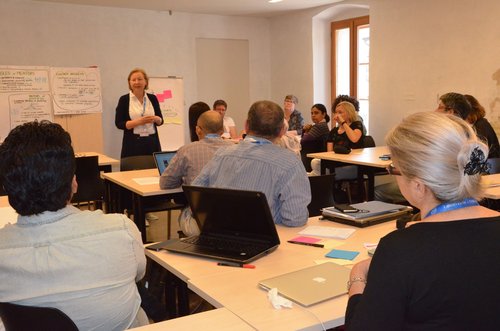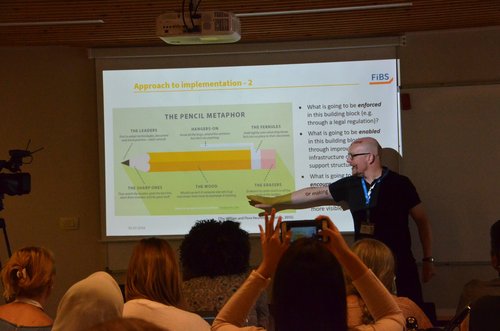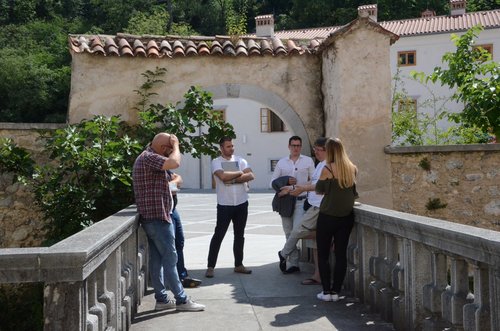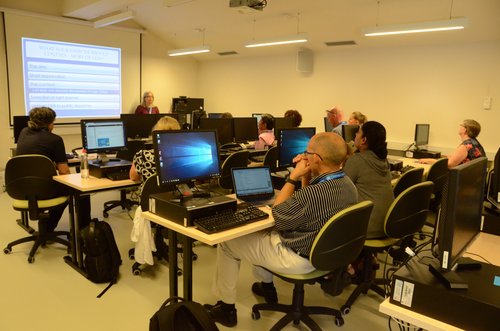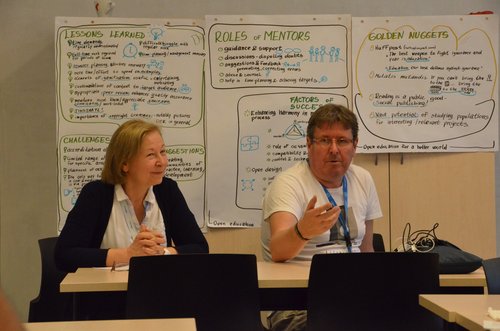Master's degree programme Leadership in Open Education (second cycle)
Master's degree in Leadership in Open Education encompasses the design, management and performance of activities related to accessibility, flexibility, quality and sustainability of learning processes. An appropriate access to knowledge may enable many persons to develop their potential needed for active social inclusion.
| Study programme: | Master's degree programme Leadership in Open Education (second cycle) |
|---|---|
| Main fields of study: | Information Technologies, Business and Administrative Sciences, Educational Sciences |
| Programme code: | 2NVOI |
| Programme cycle: | Second cycle master’s degree |
| Name of the qualification: | Master's degree |
| Qualification title: | Master of Science |
| Qualification abbreviation: | M. Sc. |
| Final examination: | no |
| Dean: | prof. dr. Imre Cikajlo |
| ECTS coordinator: | prof. dr. Iztok Arčon |
Contemporary society is characterized by major and rapid changes related to technological development, globalisation, limited resources, migrations and numerous other challenges. In managing these changes, it is necessary to use all available potentials, so changes are also needed in the field of education. On a global scale, open education, which increases the accessibility and flexibility of education with the solutions based on new information and communication technologies (ICT), is becoming increasingly important. It enables a more rational use of resources and fulfills the needs of new generations.
The study programme has been prepared in cooperation with the UNESCO Chair on Open Technologies for Open Educational Resources and Open Learning at the Jožef Stefan Insitute. The programme is designed based on the experience from our joint online mentoring programme Open Education for a Better World with contributions of international experts from both the UNESCO and the Jožef Stefan Institute. The programme contributes to the implementation of the UNESCO Recommendations on Open Educational Resources by building capacities needed to meet their valuable goals.
We offer individual consultations to prospective candidates, students and graduates to help them in the process of choosing their path of study and career. You are welcome to contact us any time before, during or after your studies. We also offer help in finding financial support for your study costs (scholarships, sponsors).
Programme description
The syllabus has a distinct interdisciplinary character, connecting information technologies, business studies and educational sciences.
The programme consists of obligatory subjects, compulsory elective subjects, general elective subjects, team project, individual project and master’s thesis.
Nine obligatory subjects enable an acquisition of in-depth knowledge, necessary for understanding the contemporary working principles in the key segments of open education, namely in its (1) design, (2) implementation and (3) management; these are the core segments of the study programme and are consistently addressed in the two years of study.
Students may choose their preferred key segment by selecting one of the three compulsory elective subjects, and may further supplement their professional profile with three additional elective subjects. The team project, the individual project and the master’s thesis are obligatory parts of the study programme. With an emphasis on solving challenging open education tasks, these obligatory parts require an interdisciplinary understanding of the field and add to the development of students’ general competences. Subject-specific competences are naturally developed as well (a list of these competences is also to the student).
Knowledge is assessed through project work and results and their public presentations, seminar papers, midterm examinations, written and oral examinations. The student completes his or her studies by defending the master's thesis in front of a three-member committee.
Students will have the opportunity to get to know the relevant current issues and trends through a strong network of participating individuals, companies and other partner institutions that, through their research and innovation, shape developments in the field of open education.
Part of the programme will be delivered remotely, due to the international study mode, and part of the programme, including conferences, will be delivered in a hybrid mode from the premises of the UNG at the Lanthieri Mansion in Vipava, as indicated in the implementation plan.
Curriculum of the study programme
Presentation for candidates for 2023/24
Admission requirements
A first degree in the fields of technical or information sciences, natural sciences, humanities, multimedia and design sciences, business and organizational sciences, and pedagogical and other social sciences, with a total of at least 180 ECTS.
Applicants with a first degree in other fields of study (180 ECTS) should send their application to the School’ study programme committee. Depending on the nature of the previous study, the study commission may determine some additional study obligations in the range of 10 to 60 ECTS. The prospective candidate should fulfill these obligations prior to enrolling the master’s study programme.
Please note that the course subjects are taught in English.
Educational and professional goals
The main objective of the study programme is to educate postgraduates who will be able to manage projects, initiatives, communities and strategic development in the area of open education in a competent manner. They will be qualified to plan, implement and manage open education at all levels of formal education, and in non-formal education, academic and business environments. They will acquire the knowledge and skills necessary to develop and implement open education on a full scale of granularity, from learning outcomes, courses, study programmes to institutional, national and transnational levels. Graduates will know how to improve educational processes by using modern information and communication technologies and successful didactic practices in a reasonable way. With the full understanding of connections between technological and pedagogical as well as business and social aspects, they will be able to professionally analyse, develop and manage the education systems at the national level or a wider one. This will enable them to conceive strategies and policies and competently provide management in the field of open education.
Alumni also possess competencies in the following areas:
- Planning and organizing open educational programs
- Managing and coordinating educational processes
- Developing innovative teaching and learning methods
- Analyzing and adapting the educational needs of individuals and groups
- Developing strategies for integrating digital technologies into open education
- Leading interdisciplinary projects in the field of open education
- Providing consultancy and support for the implementation of open education in organizations
Access to further studies
After the completion of the Master’s study programme, postgraduates can continue their study in different study programmes leading to the doctoral degree, in accordance with the enrollment requirements.
Courses refresh
1. year
| Compulsory courses | Hours | ECTS |
|---|---|---|
| Effective Didactical Practices in Open Education | 225 | 9 |
| Introduction to Open Education | 75 | 3 |
| Open Education Design | 225 | 9 |
| Open Education Strategies | 225 | 9 |
| Team Project | 225 | 12 |
| Technologies for Open Education | 150 | 6 |
| General elective courses | Hours | ECTS |
| Ensuring Security and Privacy | 150 | 6 |
| Mobile Technologies and Microlearning | 150 | 6 |
| Open Education in Industry and Business | 150 | 6 |
| Open education and society | 150 | 6 |
| Serious Games | 150 | 6 |
| Visual Communication Technologies and Their Applications in Education | 150 | 6 |
| Compulsory elective | Hours | ECTS |
| Business and Organisational Models of Open Education | 150 | 6 |
| Production of Educational Materials | 150 | 6 |
| Workshop for Open Education Practitioners | 150 | 6 |
2. year
| Compulsory courses | Hours | ECTS |
|---|---|---|
| Advanced Technologies for Open Education | 225 | 9 |
| Individual Project | 225 | 9 |
| Master's Thesis | 375 | 15 |
| Open Education Policies | 150 | 6 |
| Open education legal issues | 75 | 3 |
| Practicum in leadership skills for an inclusive knowledge society | 150 | 6 |
| General elective courses | Hours | ECTS |
| Ensuring Security and Privacy | 150 | 6 |
| Mobile Technologies and Microlearning | 150 | 6 |
| Open Education in Industry and Business | 150 | 6 |
| Open education and society | 150 | 6 |
| Serious Games | 150 | 6 |
| Visual Communication Technologies and Their Applications in Education | 150 | 6 |
| Compulsory elective | Hours | ECTS |
| Business and Organisational Models of Open Education | 150 | 6 |
| Production of Educational Materials | 150 | 6 |
| Workshop for Open Education Practitioners | 150 | 6 |

